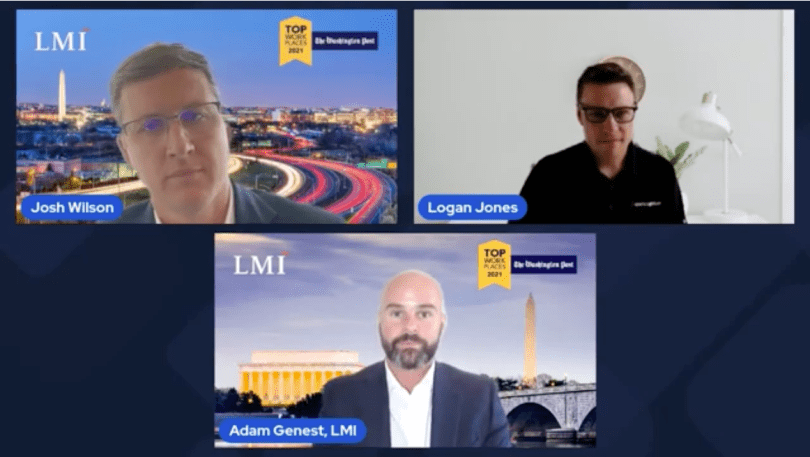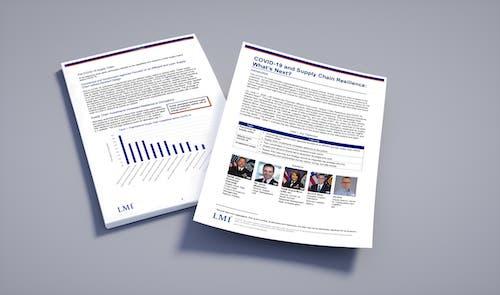
Putting the Innovation in Policy: the LMI Way
Innovation at the Pace of Need®, Policy Planning & Operations, Rapid Prototyping, Academic PartnershipsPolicy. Innovation. These two concepts carry many misperceptions.
What do policy and innovation mean at LMI?
Policy implies gravitas. High level and strategic, policy sets the vision for the management and operations of an organization. Those who access and influence policymakers and implementers—are senior government officials, C-suite executives, and other strategic leaders. However, this definition limits policy’s relevance and reach to a narrow cohort with a need for involvement.
Changing policy is slow, measured, and difficult. Any revisions or modifications require deliberation, coordination, and time to implement and institutionalize.
Innovation carries the assumptions of being a history-changing discovery or a paradigm-shifting idea—something BIG. Associated with strategic thinking, innovation actualizes a grand vision. These assumptions about the scale and magnitude of innovation lead to the belief that only people like Steve Jobs, Jeff Bezos, and Kim Jones have the license to innovate while the rest of us merely consume the fruits of their genius.
Unfortunately, this lofty perception of innovation deters incubating and prototyping ideas instead of encouraging creative thinking. Under this assumption, innovation is never modest. The friction between policy’s gradual nature and innovation’s dramatic change seemingly puts these two concepts at odds.
While these ideas about policy and innovation have some truth to them, they’re just one facet of the design, intent, and potential of policy and innovation.
Policy and innovation are accessible, universal, inclusive, and incremental. Incremental steps build the bedrock to change and transformation for practices and processes. The world is full of policies. Policies guide how people operate—at work, school, or home. “No TV until you finish your homework” is a policy that guides how children spend their time at home after school. Classroom attendance policies establish the norms and parameters for behaving in a particular environment. These policies’ users, implementers, and audience are the public. Every day, people make, implement, and practice policies in their professional and personal lives.
With innovation, it’s not only the big ideas that improve how things are done. Small ideas matter as well: adjusting prototype designs through trial and error, learning from failure, turning weaknesses into development opportunities, and persisting to build the foundations for better solutions. Innovators create change through the incremental steps of designers, researchers, and engineers on a tactical level toward strategic objectives.
LMI empowers everyone to be policy innovators.
The LMI way of policy marries policy and innovation to drive improvements and change for government solutions. We use the friction between policy and innovation as the catalyst for new ideas and perspectives. Our policy strategists—analysts, consultants, and senior consultants—in the policy practice area offer years of policy experience in a myriad of topics, including health, defense and national security, intelligence, and the environment. LMI takes an engaged approach to solutioning policy challenges for the federal government.
We treat policy dynamically and cross-functionally. Policy specialists work alongside subject matter experts, data scientists, and developers to diagnose and address all aspects of the policy challenge and secondary and tertiary effects in our comprehensive solutions for our customers, such as the Centers for Medicare and Medicaid Services, Department of Defense, Department of Homeland Security, Department of State, Department of Veterans Affairs, and U.S. Postal Service.
LMI understands the importance of the policy-innovation partnership, encouraging and rewarding innovative thought and contributions from our employees. Through the Policy Community of Practice, employees share best practices in policy analysis, instill innovation in the workplace and at customer sites, sharpen their tradecraft, and incubate small ideas into realizable and actionable steps toward innovation. The policy practice area, along with LMI’s research and development experts, partner with academic institutions and research organizations to widen our network, deepen our expertise, accelerate the pace of change, and multiply our outcomes in policy.
LMI has proof points for delivering timely, perceptive solutions to our customers. In our upcoming blog series, policy practice area team members will share their perspectives on policy and innovation, the outlook for the policy challenges of government, and LMI’s solutions to these challenges.
Featured Content
Explore All-
Read more on 'OrgIQ™: Optimize Organizational Performance '
 Insights
InsightsOrgIQ™: Optimize Organizational Performance
With OrgIQ™, face the future with confidence by preparing your organization to adapt, evolve, and excel, no matter what lies ahead.
-
Read more on 'Accelerating Government Efficiency: How LMI Helped a Major Federal Agency Drive Millions in Cost Savings '
 Insights
InsightsAccelerating Government Efficiency: How LMI Helped a Major Federal Agency Drive Millions in Cost Savings
Recent mandates call for federal agencies to streamline operations, reduce costs, and modernize systems with agility. LMI’s government efficiency and technology transformation (GETT) playbook moves agencies beyond incremental improvements, leveraging commercial solutions to drive large-scale transformation.
-
Read more on 'Meeting the Moment: A Strategic Approach to Government Efficiency and Technology Transformation '
 Insights
InsightsMeeting the Moment: A Strategic Approach to Government Efficiency and Technology Transformation
LMI's government efficiency and technology transformation (GETT) team helps you architect efficiencies in the next 90 days and reinvest in your core mission.
-
Read more on 'Unleash American AI Innovation to Accelerate Implementation of New Administration EOs '
 Insights
InsightsUnleash American AI Innovation to Accelerate Implementation of New Administration EOs
LIGER™ for Policy, LMI’s generative AI (GenAI) solution, accelerates the review of executive orders (EOs), enabling government leaders to quickly implement new administration policies and priorities.
-
Read more on 'Responding to Efficiency Mandates: Magnify™ Your Potential at Scale '
 Insights
InsightsResponding to Efficiency Mandates: Magnify™ Your Potential at Scale
Change is on the horizon! You have built your new administration transition deck, briefed your team, and quantified the business case for organization, budget, and programs. You have highlighted opportunities for efficiency and formed your own strategy for transformation.
-
Read more on 'COMPASS™: Improving Programmatic Investments and Outcomes '
 Blog
BlogCOMPASS™: Improving Programmatic Investments and Outcomes
LMI helps the government achieve these desirable outcomes by making informed decisions, prioritizing projects, creating business case analyses, and supporting each investment throughout its lifecycle.
-
Read more on 'Air Mobility Command Successfully Achieves Logistics Decision Advantage at Exercise Valiant Shield 24 '
 Blog
BlogAir Mobility Command Successfully Achieves Logistics Decision Advantage at Exercise Valiant Shield 24
The recent Exercise Valiant Shield 2024 (VS24) was not just another military drill; it was a groundbreaking opportunity for the U.S. Air Mobility Command (AMC) to test innovative technologies and improve logistics operations in near real-time.
-
Read more on 'LIGER™ for Policy: 5 Ways AI Can Help Navigate Administration Transition '
 Insights
InsightsLIGER™ for Policy: 5 Ways AI Can Help Navigate Administration Transition
New administrations bring a flurry of activity and change across the government, especially within the first 30 days. In the face of such unprecedented change at such an accelerated pace, agencies must prepare by leveraging the most modern tools at their disposal: LLMs and GenAI.
-
Read more on 'Cost Transparency: Lost in Uncharted Accounting Data? LMI is the COMPASS™ '
 Blog
BlogCost Transparency: Lost in Uncharted Accounting Data? LMI is the COMPASS™
Through our cost estimation and investment analysis line of business, LMI provides strategic insight that increases the visibility of complex accounting data, turning it into useful and actional data for agencies and their programs, operations, and reporting.
-
Read more on 'The Power of Integrating Programing, Planning, Budgeting, and Execution (PPBE) with Financial Data Analytics '
 Blog
BlogThe Power of Integrating Programing, Planning, Budgeting, and Execution (PPBE) with Financial Data Analytics
Incorporating financial data analytics into the PPBE process transforms how agencies and programs manage their resources for data-driven decisions, greater efficiency, and increased alignment with strategic goals.
-
Read more on 'Agile Program Management and Cost Estimating: A Winning Combination '
 Blog
BlogAgile Program Management and Cost Estimating: A Winning Combination
By incorporating agile principles, organizations can reduce turnaround times for estimates, incorporate estimating results earlier in the acquisition process, reduce risks, and improve overall project outcomes.
-
Read more on 'LIGER™ for Policy '
 Insights
InsightsLIGER™ for Policy
As a multifaceted platform, LIGER™ accelerates policy work in numerous ways, enhancing policy assessment and deepening the insights and impact of policy.
-
Read more on 'Low Code, High Impact '
 Insights
InsightsLow Code, High Impact
In an era where federal leaders are under increasing pressure to do more with less, the need to maximize the potential of their workforce through lean program operations has never been greater. Learn how LMI is accelerating program operations and driving change.
-
Read more on 'Automating Financial Responsibilities '
 Insights
InsightsAutomating Financial Responsibilities
How LMI’s Performance Optimization and Adaptive Digital Operations Lines of Business are Streamlining Processes by employing Robotic Process Automation.
-
Read more on 'Managing Planning Assumptions '
 Insights
InsightsManaging Planning Assumptions
Project planning always requires addressing uncertainty. When confronted with multiple possible futures, planners must make assumptions about which reality is most likely to be true.
-
Read more on 'Unlocking the Potential of GenAI for Streamlined Federal Contracting '
 Insights
InsightsUnlocking the Potential of GenAI for Streamlined Federal Contracting
LMI’s tailored acquisition solutions enable customers to make informed decisions for acquisition program management and contracting.
-
Read more on 'Workforce Evolution in the Age of AI '
 Blog
BlogWorkforce Evolution in the Age of AI
Read about our perspectives on how leaders can plan for, acquire, develop, retain, and transition talent as the workforce evolves in the age of AI.
-
Read more on 'Generative AI, Automation, Bots, and the need to ensure new technologies making today easier, aren’t adding to tomorrow’s risks! '
 Insights
InsightsGenerative AI, Automation, Bots, and the need to ensure new technologies making today easier, aren’t adding to tomorrow’s risks!
LMI can help any government organization select and oversee software providers to implement technology responsibly and according to regulations.
-
Read more on 'Performance Optimization: Integrated Solutions that Power Your Organization '
 Blog
BlogPerformance Optimization: Integrated Solutions that Power Your Organization
At LMI, we meet customers where they are in their performance optimization journey, tailoring technology-agnostic options for customers based on their needs. We focus on unlocking people’s full potential and using readily accessible data and technology to position organizations for long-term sustainability.
-
Read more on 'Effective Property Tracking Improves Audit Results '
 Insights
InsightsEffective Property Tracking Improves Audit Results
In keeping with the principles of LMI’s performance optimization line of business, our teams of subject matter experts optimize key controls for consistent, compliant, and effective operations. LMI leverages considerable experience across DoD in optimizing and updating internal controls and remediating audit findings to work with organizations.
-
Read more on 'Agile Project Scheduling: The LMI Way '
 Insights
InsightsAgile Project Scheduling: The LMI Way
At LMI, we tailor agile frameworks to address your needs. Whether you are implementing a hybrid or traditional PMO schedule, LMI’s adaptable schedule processes will get you there. Through our performance optimization line of business, LMI uses agile scheduling to enhance the efficiency and effectiveness of organizations and operations.
-
Read more on 'Risk Management in an Agile World '
 Insights
InsightsRisk Management in an Agile World
Coupled with its Performance Optimization Line of Business, LMI uses Risk Management to enhance the efficiency and effectiveness of organizations and operations. If your organization is looking to better integrate Project and Risk Management activities within your specific Agile environment, LMI’s team of Project and Portfolio Management (PPM) subject matter experts can help.
-
Read more on 'Strategic Investment Management: Optimizing Government Outcomes '
 Insights
InsightsStrategic Investment Management: Optimizing Government Outcomes
LMI adopts a comprehensive approach to support government investments, ensuring meticulous execution and inclusion of all relevant stakeholders throughout the investment lifecycle.
-
Read more on 'Driving Financial Excellence: Dashboarding for Strategic Insights '
 Insights
InsightsDriving Financial Excellence: Dashboarding for Strategic Insights
Setting up a financial dashboard with LMI has greater benefits than following a trend. Our dashboards move your mission toward efficiency, clarity, and transparency.
-
Read more on 'LMI and UVA's Data Entrepreneurship Challenge: Embracing Innovation and Collaboration for the Social Good '
 Academic Partnership
Academic PartnershipLMI and UVA's Data Entrepreneurship Challenge: Embracing Innovation and Collaboration for the Social Good
LMI and the University of Virginia School of Data Science (UVA SDS) have a long partnership: collaborating on research, sponsored capstone projects, internships, and faculty engagements; speaking jointly at student-run organization events; teaming on government contracts; and, of course, actively hiring new graduates. This year, we achieved a new milestone with the launch of our inaugural Data Entrepreneurship Challenge (DEC).
-
Read more on 'Greatest Challenges for Making Effective Policy? '
 Insights
InsightsGreatest Challenges for Making Effective Policy?
Through the LMI Way of Policy, LMI has identified several key challenges at each stage of the policy life cycle to help guide organizations through these key issues, while avoiding predictable pitfalls along the way.
-
Read more on 'Better Decisions with Analytical Hierarchy Process '
 Insights
InsightsBetter Decisions with Analytical Hierarchy Process
When decisions have a broad impact, decision makers often require input from program stakeholders, subject matter experts (SME), and end users. LMI helps agencies make gathering and analyzing that input repeatable and defendable.
-
Read more on 'The LMI Way of Policy: Five Factors to Ensure Effective Policy Lifecycle Management '
 Insights
InsightsThe LMI Way of Policy: Five Factors to Ensure Effective Policy Lifecycle Management
Through a five-factor approach, LMI delivers impactful policies that are co-created and implemented as drivers of change, innovation, and agility through all levels of an organization.
-
Read more on 'Helping the Best Become Even Better '
 Human Capital Solutions
Human Capital SolutionsHelping the Best Become Even Better
While LMI strives to help each customer go further, pushing boundaries is literally the mission of one longtime customer, NASA. For nearly 20 years, LMI has supported NASA’s human capital (HC) function, delivering program management, change management, and ad hoc services to meet its needs.
-
Read more on 'Innovating the PPBE Process at the Pace of Need '
 Innovation at the Pace of Need®
Innovation at the Pace of Need®Innovating the PPBE Process at the Pace of Need
As trusted providers of Innovation at the Pace of Need®, LMI stands ready to adapt PPBE processes to support the future of DoD and other federal agencies’ missions.
-
Read more on 'Three Steps Toward Creating Government Experiences That Put Customers First '
 Insights
InsightsThree Steps Toward Creating Government Experiences That Put Customers First
The increasing disruptions from modern technological advancements, and geopolitical tide changes demand that government organizations double-down on customers’ experience to restore the prestige of our democratic institutions.
-
Read more on 'Where Insight Meets Innovation '
 Innovation at the Pace of Need®
Innovation at the Pace of Need®Where Insight Meets Innovation
Possibility starts with people. Our project teams push the boundaries of capability for our customers. We integrate extensive federal expertise with emerging technology experts to rapidly develop creative solutions.
-
Read more on 'Tips for Successful IT Adoption Management '
 Insights
InsightsTips for Successful IT Adoption Management
When it comes to transformation projects, the risk of failure falls between 70 to 95 percent. While the reasons for failure vary, the overarching challenge is related to people—and most IT deployments do not result in cost savings or improvements to the mission.
-
Read more on 'Three Considerations for VA and DHA Digital Transformation '
 Innovation at the Pace of Need®
Innovation at the Pace of Need®Three Considerations for VA and DHA Digital Transformation
The transformation will improve organizations and patient outcomes. LMI experts have been strategic partners throughout other large-scale digital transformations and offer insights to help these projects succeed.
-
Read more on 'Five Practices for Building Resilience: For You and Your Team '
 Insights
InsightsFive Practices for Building Resilience: For You and Your Team
In the article “What Resilience Means, and Why It Matters,” Andrea Ovans describes resiliency as “the ability to recover from setbacks, adapt well to change, and keep going in the face of adversity.” Resiliency is an essential component of dynamic leadership and critical for promoting a team’s well-being and performance and preventing burnout. The more challenging the environment, the more crucial it is—and our current work/life environment is more challenging than ever before.
-
Read more on 'Exciting Results Behind the Scenes of Account Reconciliation '
 Insights
InsightsExciting Results Behind the Scenes of Account Reconciliation
LMI's Financial Operations and Accountability practice area has produced exciting results for the General Services Administration's National Rent Bill Office through our highly effective account reconciliation process.
-
Read more on 'Employee Spotlight: Meet Corinne Tochman '
 Culture News
Culture NewsEmployee Spotlight: Meet Corinne Tochman
"Innovation is always necessary to serve the customer because change is the only constant in life."
-
Read more on 'Strategies and Tactics for Engaging High, Medium, and Low Performers '
 Innovation at the Pace of Need®
Innovation at the Pace of Need®Strategies and Tactics for Engaging High, Medium, and Low Performers
Organizations with a positive team culture tend to have more engaged, higher performing employees.
-
Read more on '‘Tis the Season of Lame Duck Appropriations '
 Insights
Insights‘Tis the Season of Lame Duck Appropriations
It’s no surprise the federal government is operating under a continuing resolution (CR)—timely passage of appropriation bills has been a rarity for decades. The burning question is, what will happen when the current CR ends during this lame-duck congressional session?
-
Read more on 'Technology Assessment Methodology and Tools for Federal Agencies '
 Innovation at the Pace of Need®
Innovation at the Pace of Need®Technology Assessment Methodology and Tools for Federal Agencies
LMI’s Dawson Oslund discusses technology assessment methodology and tools for federal agency solutions.
-
Read more on 'Predicting Failure: Is the Government Finally Ready for Predictive Fleet Maintenance? '
 Innovation at the Pace of Need®
Innovation at the Pace of Need®Predicting Failure: Is the Government Finally Ready for Predictive Fleet Maintenance?
Our workshop brought together experts from government, industry, and academia to identify the past obstacles to progress and propose solutions.
-
Read more on 'To Improve FEVS Scores, Take a Deeper Dive into the “eh” '
 Innovation at the Pace of Need®
Innovation at the Pace of Need®To Improve FEVS Scores, Take a Deeper Dive into the “eh”
Whether you’re managing a small office or an entire organization, look for ways to improve your Federal Employee Viewpoint Survey (FEVS) scores across the board — not just in the negative areas. Making incremental changes that are meaningful and measurable in all areas can help improve employee engagement and morale. However, to do so, you first have to uncover the underlying reasons for the scores.
-
Read more on 'How Value-Based Care Can Improve for Patients, Providers and Payers Post COVID-19 '
 Insights
InsightsHow Value-Based Care Can Improve for Patients, Providers and Payers Post COVID-19
The federal government has focused on value-based care to increase efficiency in healthcare. Here’s what we must do to ensure the model’s success.
-
Read more on 'Managing the Return to Onsite Work: There’s No One-Size-Fits-All Solution '
 Insights
InsightsManaging the Return to Onsite Work: There’s No One-Size-Fits-All Solution
Managing the Return to Onsite Work: There’s No One-Size-Fits-All Solution
To successfully return from remote to onsite work, managers will need to draw on all their leadership skills, including empathy, flexibility, and agility.
-
Read more on 'Managing Up to Achieve Success for You, Your Supervisor, and Your Organization '
 Insights
InsightsManaging Up to Achieve Success for You, Your Supervisor, and Your Organization
No matter your level, managing up is a soft skill that’s essential for getting things done, succeeding at your job, or getting promoted. Thousands of books have been written on this topic because our individual success not only depends on how well we do our jobs, or how we collaborate with our colleagues, or even how good we are at managing people under our own supervision, but also on how well we manage our relationships with the people above us. Easier said than done, right? That may be true, but there are several things you can do to help.
-
Read more on 'The Top 3 Strategies Every Leader Needs for a Successful Digital Transformation '
 Insights
InsightsThe Top 3 Strategies Every Leader Needs for a Successful Digital Transformation
Successful organizational change depends on leaders who can inspire innovation, create digital strategies, understand and lead an agile team, and leverage the power of standing-up new technology solutions while managing risks.
-
Read more on 'To Improve Federal Workplace Morale, Simple Civility Is Not Enough '
 Innovation at the Pace of Need®
Innovation at the Pace of Need®To Improve Federal Workplace Morale, Simple Civility Is Not Enough
Building an inclusive, positive work environment that enables cohesion and collaboration requires not just civility, but “active” civility.
-
Read more on 'Employee Spotlight: Meet Ray Compton '
 Culture News
Culture NewsEmployee Spotlight: Meet Ray Compton
Ray Compton, a retired U.S. Army colonel, joined LMI in 2019 and serves as a principal for National Security Science & Technology, supporting internal and external LMI stakeholders in the strategic development of integrated solutions for capability gaps in national defense.
-
Read more on 'Employee Spotlight: Meet Katherine Coles '
 Culture News
Culture NewsEmployee Spotlight: Meet Katherine Coles
Katherine is passionate about helping leaders and teams build high-performing cultures and achieve organizational goals.
-
Read more on 'Demystifying the Annual Budget Process '
 Insights
InsightsDemystifying the Annual Budget Process
We assist our federal customers in drafting compelling budget justification material for the President’s Budget and thorough responses to congressional inquiries.
-
Read more on 'Better Decisions Leveraging Existing Data: LMI’s Approach to Evidence Act Evaluations '
 Insights
InsightsBetter Decisions Leveraging Existing Data: LMI’s Approach to Evidence Act Evaluations
LMI established and implemented tools and approaches to assist evaluations officers in scoring and selecting evaluation topics, creating annual evaluation plans, and executing discrete evaluations.
-
Read more on 'Cost Estimation Best Practices for Better Program Decisions and Outcomes '
 Insights
InsightsCost Estimation Best Practices for Better Program Decisions and Outcomes
Beyond accuracy, program managers and decision-makers must understand the major tradeoffs to right-size programs and budgets for the best outcome for the American taxpayer.
-
Read more on 'Next-Level Program Management with Master Scheduling '
 Innovation at the Pace of Need®
Innovation at the Pace of Need®Next-Level Program Management with Master Scheduling
Advanced programs have diverse milestones and end goals. Executives require an abstract, high-level summary of these elements while analysts need concrete, actionable details. A well-engineered and tailored schedule enables all stakeholders to access the appropriate information to achieve mission success.
-
Read more on 'Data Analytics Can Address the U.S. Substance Abuse Crisis '
 Insights
InsightsData Analytics Can Address the U.S. Substance Abuse Crisis
Substance abuse is on the rise in America, but the federal government has an opportunity to leverage data analytics for an effective response.
-
Read more on 'Calculating Your Water Footprint to Improve Resilience '
 Innovation at the Pace of Need®
Innovation at the Pace of Need®Calculating Your Water Footprint to Improve Resilience
One way to calculate an organization’s water footprint is to literally measure the water used at a facility or series of facilities. But what happens when operations are far more complicated?
-
Read more on 'Countering Threats through Innovative Synergies '
 Perspective
PerspectiveCountering Threats through Innovative Synergies
As a project leader at LMI, Joe Cartelli supports two Joint Enterprise Omnibus Program Engineering and Technical Support contracts by managing client relations and five delivery orders.
-
Read more on 'Accelerating Integrated Early Warning for DoD’s CBRN Defense '
 Innovation at the Pace of Need®
Innovation at the Pace of Need®Accelerating Integrated Early Warning for DoD’s CBRN Defense
LMI delivered a rapid capability prototype that emulates new CBRN detection technologies in operational environments.
-
Read more on 'COVID-19: What Suppliers Can Do Now '
 Perspective
PerspectiveCOVID-19: What Suppliers Can Do Now
How to stay strategic as the pandemic’s ripple effect grows.
-
Read more on 'Addressing Complex Problems '
 Culture News
Culture NewsAddressing Complex Problems
During his 30-year tenure at LMI, Bruce Kaplan has used his expertise in defense logistics and research and development to help LMI and its clients succeed. With a strong commitment to innovation and exceeding customer expectations, Bruce has led efforts to modernize logistics through finding, developing, and pushing pioneering technologies. Learn about Bruce’s role as a logistics strategy and integration fellow and his plans to continue making a positive difference at LMI.
-
Read more on 'Business & Digital Transformation '
 What We Do
What We DoBusiness & Digital Transformation
LMI takes customers on a tailored digital transformation journey, ranging from small digital enhancements to enterprise-wide transformations.
-
Read more on 'Infrastructure Resilience '
 What We Do
What We DoInfrastructure Resilience
LMI helps federal agencies strengthen infrastructure resiliency with data-driven strategies.
-
Read more on 'LMI Quick Thoughts Series '
 Video
VideoLMI Quick Thoughts Series
Our experts share their insights on challenges faced by the federal government in these brief videos.
-
Read more on 'LMI Awarded $98M Small Business Innovation Phase III Contract Through Use of RAPTR®, a Proven and Trusted Modeling, Simulation & Analysis Platform for the Space Force '
 Press Release
Press ReleaseLMI Awarded $98M Small Business Innovation Phase III Contract Through Use of RAPTR®, a Proven and Trusted Modeling, Simulation & Analysis Platform for the Space Force
The U.S. Air Force awarded LMI a 5-year indefinite delivery/indefinite quantity Small Business Innovation Research (SBIR) Phase III contract with two initial task orders to expand support to the Space Security and Defense Program (SSDP) and the Space Warfighting Analysis Center (SWAC).
-
Read more on 'LMI Expands Space Market Footprint with New Colorado Springs Office '
 Press Release
Press ReleaseLMI Expands Space Market Footprint with New Colorado Springs Office
LMI’s newest office includes state-of-the-art demonstration areas to showcase space domain solutions, such as LMI’s RAPTR® and LIGER™, and is uniquely positioned to help Space Force Guardians design, test, and train for the nation’s next-generation capabilities in space.
-
Read more on 'Dr. Mark Eddings Joins LMI Leadership as Senior Vice President, Space Market '
 Press Release
Press ReleaseDr. Mark Eddings Joins LMI Leadership as Senior Vice President, Space Market
LMI is pleased to announce that Dr. Mark Eddings has joined LMI as senior vice president, space market. He brings 15 years of experience supporting the national security space industry.
-
Read more on 'Thomas McConnell '
 Our Team
Our TeamThomas McConnell
Tom McConnell leads LMI’s Strategy & Digital Transformation (S&DT) practice area and NASA portfolio, supporting government customers with mission-driven innovation, modernization, and transformation initiatives.
-
Read more on 'Ranger™ Framework: Exploring with Ranger™ '
 Publication
PublicationRanger™ Framework: Exploring with Ranger™
Ranger™ is a deconstructed agile framework designed for the development of quick (~45 business day) prototypes and research projects. It best serves efforts around feasibility rather than perfect implementation.
-
Read more on 'Healthcare Compliance '
 What We Do
What We DoHealthcare Compliance
LMI’s compliance approach centers on reducing programmatic risks while minimizing participants’ burden through data analytics and proactive engagement and education.
-
Read more on 'Christine Cocrane '
 Our Leadership Team
Our Leadership TeamChristine Cocrane
Christine (Chrissy) leads a dynamic practice of human, programmatic, scientific, and technological management consulting professionals. She is responsible for driving innovative and digitally enabled capabilities in the areas of business modernization, organizational transformation, workforce evolution and strategic analytics and insights, all to support a broad federal mission space.
-
Read more on 'Talent Ignite™ '
 Innovation at the Pace of Need®
Innovation at the Pace of Need®Talent Ignite™
Talent Ignite™ is an artificial intelligence/machine learning (AI/ML) powered talent management application with a suite of interoperable modules for deployment separately or in any combination to augment your human resource (HR) or talent management systems.
-
Read more on 'Innovation in VA Health '
 Who We Serve
Who We ServeInnovation in VA Health
LMI delivers innovative health solutions for mission impact at the pace of need, enabling our federal health customers to thrive while adapting to modern mission needs.
-
Read more on 'Human Capital Analytics & the Workforce of the Future '
 What We Do
What We DoHuman Capital Analytics & the Workforce of the Future
Leveraging technology, psychology, and organizational design to find, attract, and retain the right people for your missions.
-
Read more on 'Intelligence '
 Who We Serve
Who We ServeIntelligence
Our strategic advisory services are coupled with innovative digital solutions to reduce the time to mission value for our customers.
-
Read more on 'LMI Forge Tech Showcase & Human Capital Analytics Workshop '
 Event
EventLMI Forge Tech Showcase & Human Capital Analytics Workshop
Thursday, November 2, 2023
-
Read more on 'Raymond Compton '
 Our Team
Our TeamRaymond Compton
Ray Compton, a retired U.S. Army colonel, joined LMI in 2019 and serves as a principal for National Security Science & Technology, supporting internal and external LMI stakeholders in the strategic development of integrated solutions for capability gaps in national defense.
-
Read more on 'LMI Forge Technology Studio: Prototypes '
 Innovation at the Pace of Need®
Innovation at the Pace of Need®LMI Forge Technology Studio: Prototypes
Our prototypes are shaping the nation of next. From developing a wearable integrated sensor platform (WISP) that drives decision-making to shaping solutions that streamline supply chains like LogSmart™ Supply, our work at the edge of possible reimagines mission capability.
-
Read more on 'Innovation Space '
 Innovation at the Pace of Need®
Innovation at the Pace of Need®Innovation Space
From Big IoT Data Streaming to our Rapid Analysis and Prototyping Toolkit for Resiliency, LMI's innovation space showcases our ecosystem of solutions.
-
Read more on 'Logistics Decision Advantage '
 What We Do
What We DoLogistics Decision Advantage
The competitive edge that integrates multiple logistics domains to enable complex operations decisions. LMI’s Logistics Decision Advantage (LDA) creates strategic advantage with trusted data insight for faster, more intelligent action.
-
Read more on 'What We Do '
 Innovation at the Pace of Need®
Innovation at the Pace of Need®What We Do
Supporting missions that have shaped the nation since 1961, we apply long-standing expertise to create sustainable solutions.
-
Read more on 'Performance Optimization '
 What We Do
What We DoPerformance Optimization
Unlocking people’s full potential and using readily accessible data and technology to position organizations for long-term sustainability.
-
Read more on 'LMI Acquires JJR Solutions, Expands Technology Modernization Capabilities '
 Press Release
Press ReleaseLMI Acquires JJR Solutions, Expands Technology Modernization Capabilities
LMI, a provider of technology-enabled management consulting, logistics, and digital and analytics solutions to the U.S. government, announced its acquisition of JJR Solutions, a business rooted in military service that is working to improve the nation’s health and security through user experience and technology solutions.
-
Read more on 'LMI Forge Technology Showcase '
 Event
EventLMI Forge Technology Showcase
Thursday, May 2nd, 2024
-
Read more on 'Programmatic Efficiencies & Effectiveness '
 What We Do
What We DoProgrammatic Efficiencies & Effectiveness
Our team delivers the insights, tools, people, and processes for lifecycle program management, planning, and operations support as well as full-scope financial solutions.
-
Read more on 'Policy Planning & Operations '
 What We Do
What We DoPolicy Planning & Operations
We excel at helping leaders leverage automated analytic solutions to expedite policy analysis and evaluation and quantify the effects of new regulations.
-
Read more on 'About LMI '
 Innovation at the Pace of Need®
Innovation at the Pace of Need®About LMI
Combining a legacy of federal expertise with an innovation ecosystem, we minimize time to value and accelerate mission success. With an emphasis on agile development and human-centered design, we enable agencies to experience solutions faster and conquer their toughest challenges sooner.
-
Read more on 'Workforce Evolution '
 What We Do
What We DoWorkforce Evolution
LMI’s holistic solutions help government workforces adapt to evolving goals and technological shifts, maximizing productivity and potential. We combine human capital expertise with innovation and technology to enhance employee experience, boost impact, and optimize talent across the management lifecycle. Using agile methodologies and digital tools, LMI accelerates workforce evolution.
-
Read more on 'Business Modernization '
 What We Do
What We DoBusiness Modernization
LMI helps leaders stay relevant, efficient, and adaptive in a dynamic business landscape. We modernize and streamline operations so leaders can focus on their mission. Our solutions leverage business process improvement, digital product innovation, and adaptive business operations, using cutting-edge tools and technology to help you thrive in an increasingly digital world.
-
Read more on 'Organizational Transformation '
 What We Do
What We DoOrganizational Transformation
LMI architects, plans, and implements complex organizational transformations that ensure mission delivery while fostering cultural, procedural, and systemic change. Our initiative driven, organization-wide tiger team approach, combined with multimedia communication strategies and data-driven insights, drives continuous improvement and keeps your workforce informed.
-
Read more on 'How We Innovate '
 Innovation at the Pace of Need®
Innovation at the Pace of Need®How We Innovate
Operating in an innovation ecosystem, we combine market-leading technical resources, strategic partnerships, and agile development capabilities to accelerate mission success.
-
Read more on 'Aspiration to Operation: LMI's Four Key Concepts to Convert Next-Generation, Service-Specific Doctrines into Overwhelming Joint Force Combat Power in the Indo-Pacific '
 Publication
PublicationAspiration to Operation: LMI's Four Key Concepts to Convert Next-Generation, Service-Specific Doctrines into Overwhelming Joint Force Combat Power in the Indo-Pacific
Learn about LMI’s paradigm-shifting vision and how we are already advancing it in partnership with DoD.
-
Read more on 'LMI Unveils Groundbreaking GenAI Solution: LIGER™ '
 Press Release
Press ReleaseLMI Unveils Groundbreaking GenAI Solution: LIGER™
LIGER™ harnesses the power of advanced technology, data analytics, and the latest in machine learning and natural language processing to provide secure, private, and trustworthy GenAI solutions for government.
-
Read more on 'LMI Selected to Support Army Digital Transformation Initiatives '
 Press Release
Press ReleaseLMI Selected to Support Army Digital Transformation Initiatives
LMI has been selected to provide Technical Services and Products to the Deputy Assistant Secretary of the Army for Data, Engineering, and Software (DASA-DES). This contract, with a ceiling value of $47.6M, represents a new milestone in LMI's commitment to supporting the U.S. Army's digital transformation efforts.
-
Read more on 'LMI to Deliver Groundbreaking AI Solution, LIGER™, to the U.S. Army '
 Press Release
Press ReleaseLMI to Deliver Groundbreaking AI Solution, LIGER™, to the U.S. Army
LMI has been awarded a contract to provide technical services and products to the Deputy Assistant Secretary of the Army for Data, Engineering, and Software (DASA-DES). LMI will use its groundbreaking generative artificial intelligence (GenAI) solution, LIGER™, to enhance the Army’s digital capabilities at Impact Level 5.
-
Read more on 'Publications '
 Insights
InsightsPublications
LMI invests in research to benefit the public sector. We consider the many facets of the most-pressing issues, evaluate options, then publish our results to help public-sector leaders make well-informed decisions for the best results.
-
Read more on 'Press Releases '
 Insights
InsightsPress Releases
Explore our press releases to find out what’s new at LMI.
-
Read more on 'Blog '
 Insights
InsightsBlog
Engage with LMI thought leaders as they present timely insights, research and innovation, company news, culture stories, and perspectives on a variety of issues and topics.
-
Read more on 'Newsroom '
 Insights
InsightsNewsroom
Explore our Newsroom to access our press releases, blog, publications, and more.
-
Read more on 'News & Events '
 Insights
InsightsNews & Events
Explore our press releases and events to find out what’s new at LMI.
-
Read more on 'Enterprise Agility '
 What We Do
What We DoEnterprise Agility
Employing an Agile mindset to accelerate organizational transformation, strengthen programs, and meet dynamic business needs.
-
Read more on 'Countering Weapons of Mass Destruction '
 Innovation at the Pace of Need®
Innovation at the Pace of Need®Countering Weapons of Mass Destruction
LMI helps customers adopt the latest capabilities and methodologies to advance the CWMD and chemical, biological, radiological, and nuclear (CBRN) defense missions.
-
Read more on 'Mission Engineering '
 What We Do
What We DoMission Engineering
Integrating modeling and simulation, supply chain engineering, wargaming, and more, LMI harnesses more than 60 years of cutting-edge innovation and experience to enhance capabilities and technologies in support of our customers’ most challenging mission requirements.
-
Read more on 'LMI History '
 Innovation at the Pace of Need®
Innovation at the Pace of Need®LMI History
With a legacy of solving the government’s most complex challenges and an outcome-driven model to execute above expectation, LMI transforms missions with solutions that define the new speed of possible.
-
Read more on 'Thank You for Your Interest in LMI '
 Careers
CareersThank You for Your Interest in LMI
If you'd like to apply directly to a position, please click the link to search our open positions.
-
Read more on 'LMI Selected to Support the Food and Drug Administration Business Operations, Optimization, and Modernization BPA '
 Press Release
Press ReleaseLMI Selected to Support the Food and Drug Administration Business Operations, Optimization, and Modernization BPA
LMI will support the FDA through the BOOM BPA, in optimizing and modernizing its business operations to align with strategic priorities and increase the effectiveness of FDA organizations.
-
Read more on 'LMI Selected to Support Assessment, Monitoring, and Evaluation for Security Cooperation Programs '
 Press Release
Press ReleaseLMI Selected to Support Assessment, Monitoring, and Evaluation for Security Cooperation Programs
LMI will help establish an assessment, monitoring, and evaluation (AM&E) program for the Department of Defense.
-
Read more on 'LMI Selected as 2020 U.S. Postal Service Supplier Performance Award Winner '
 Press Release
Press ReleaseLMI Selected as 2020 U.S. Postal Service Supplier Performance Award Winner
U.S. Postal Service selects LMI as a Service Supplier Performance Award recipient for their work in, project, program and portfolio management. LMI has supported the U.S. Postal Service for over 20 years to foster innovation to improve process and program performance.
-
Read more on 'PowerPMO™ '
 Innovation at the Pace of Need®
Innovation at the Pace of Need®PowerPMO™
LMI's PowerPMO™ mid-tier low code approach embraces lean and agile principles to provide more affordable and readily available technology solutions for our federal government customers.
-
Read more on 'Operation Warp Speed '
 What We Do
What We DoOperation Warp Speed
LMI provided expertise in planning, strategy development, tools, and techniques in coordination and support of Operation Warp Speed.
-
Read more on 'Digital Twin '
 What We Do
What We DoDigital Twin
LMI uses digital twin technology to help government agencies obtain visibility, achieve situational awareness, and improve enterprise-wide decisions.
-
Read more on 'Randal Dragon '
 Our Team
Our TeamRandal Dragon
Randal leads LMI’s defense market business development team’s strategic planning activities, including identifying growth targets and solution and core offering development.
-
Read more on 'LMI Expands Digital Transformation Efforts for DLA Defense Enterprise Data Standards Office '
 Press Release
Press ReleaseLMI Expands Digital Transformation Efforts for DLA Defense Enterprise Data Standards Office
LMI has been awarded a $9.4 million contract to continue functional and logistics systems interoperability support services for the Defense Logistics Agency (DLA) Information Operations (J6), Defense Enterprise Data Standards Office (DEDSO).
-
Read more on 'LMI Migrating the Maintenance and Availability Data Warehouse to Advana '
 Press Release
Press ReleaseLMI Migrating the Maintenance and Availability Data Warehouse to Advana
LMI has been awarded a 1-year, $1.5 million contract for a one-time data migration from the LMI-created Maintenance and Availability Data Warehouse (MADW) to the Advana Data Warehouse for the Joint Artificial Intelligence Center.
-
Read more on 'LMI Awarded Contract to Deliver NADACS Across Navy Public Shipyards '
 Press Release
Press ReleaseLMI Awarded Contract to Deliver NADACS Across Navy Public Shipyards
LMI has been awarded a $42.8M task order, with a total contract value of $98.4M, to deploy the Naval Autonomous Data Collection System (NADACS) across four U.S. Navy public shipyards.
-
Read more on 'LMI to Support Veteran Suicide Prevention with New VA Contract '
 Press Release
Press ReleaseLMI to Support Veteran Suicide Prevention with New VA Contract
LMI has been selected to provide suicide prevention program support for the U.S. Department of Veterans Affairs (VA) Office of Mental Health (OMH) and Office of Suicide Prevention (OSP).
-
Read more on 'Symposium Registration | Generative AI 2024 '
 Event
EventSymposium Registration | Generative AI 2024
Please join us for LMI’s symposium, Real-World Gen AI: A Tool for Today’s Government, A Vision for Tomorrow.
-
Read more on 'LMI to Provide Data and Analysis Support to Air Force Sustainment Center (AFSC) Logistics Directorate (LG) '
 Press Release
Press ReleaseLMI to Provide Data and Analysis Support to Air Force Sustainment Center (AFSC) Logistics Directorate (LG)
LMI will provide the Air Force (AF) and the Air Force Sustainment Center (AFSC) Logistics Directorate (LG) Office with highly specialized services and analysis to support Readiness-Spares Packages (RSP) and Readiness-Based Sparing (RBS).
-
Read more on 'LMI to Develop SCREEn Supply Chain Risk Management Support Capability for DoD '
 Press Release
Press ReleaseLMI to Develop SCREEn Supply Chain Risk Management Support Capability for DoD
The United States Transportation Command (USTRANSCOM) Strategic Plans, Policy, and Logistics Directorate has selected LMI for strategic campaign planning and support for the Department of Defense Functional Campaign Plan for Global Deployment and Distribution and USTRANSCOM’s Combatant Command Campaign Plan.
-
Read more on 'LMI Selected to Continue Partnership with Defense Standardization Program Office '
 Press Release
Press ReleaseLMI Selected to Continue Partnership with Defense Standardization Program Office
The Department of Defense’s Defense Standardization Program Office (DSPO) has selected LMI to continue enhancing the DSPO’s initiatives and activities through technical and functional services.
-
Read more on 'Workshop | Empowering Government with Generative AI: Large Language Models for Public Service '
 Event
EventWorkshop | Empowering Government with Generative AI: Large Language Models for Public Service
Tuesday, September 5th, 2023
-
Read more on 'LMI Secures $604 Million U.S. Border Patrol Task Order '
 Press Release
Press ReleaseLMI Secures $604 Million U.S. Border Patrol Task Order
LMI has been awarded a one-year base period and four, one-year options task order for a ceiling value of $604 million to support the U.S. Border Patrol’s Program Management Office Directorate (USBP PMOD), marking the largest contract award in LMI’s more than 60-year history.
-
Read more on 'LMI’s Technology and Innovation Showcase '
 Event
EventLMI’s Technology and Innovation Showcase
Join us on Thursday, October 10th to experience firsthand how LMI constructs early-stage concepts on advanced technology.
-
Read more on 'CMS Selects LMI to Support ACO Medicare Shared Savings Program '
 Press Release
Press ReleaseCMS Selects LMI to Support ACO Medicare Shared Savings Program
The Centers for Medicare and Medicaid Services (CMS) has selected LMI to provide strategic development and implementation support for the Medicare Shared Savings Program.
-
Read more on 'LMI Human Performance Program Enhancing U.S. Air Force Air Education and Training Command '
 Press Release
Press ReleaseLMI Human Performance Program Enhancing U.S. Air Force Air Education and Training Command
The United States Air Force Air Education and Training Command (AETC), 17th Training Group, 312th Training Squadron, has selected LMI to support its mission of training and developing fire emergency services across the Department of Defense.
-
Read more on 'LMI to Support USTRANSCOM in Campaign Planning for Global Deployment, Distribution, and Capability Development '
 Press Release
Press ReleaseLMI to Support USTRANSCOM in Campaign Planning for Global Deployment, Distribution, and Capability Development
The United States Transportation Command (USTRANSCOM) Strategic Plans, Policy, and Logistics Directorate has selected LMI for strategic campaign planning and support for the Department of Defense Functional Campaign Plan for Global Deployment and Distribution and USTRANSCOM’s Combatant Command Campaign Plan.
-
Read more on 'LMI Selected to Provide Program Management Office (PMO) Support to Global Combat Support System Army (GCSS-Army) '
 Press Release
Press ReleaseLMI Selected to Provide Program Management Office (PMO) Support to Global Combat Support System Army (GCSS-Army)
LMI has been awarded a five-year, $65 million contract to provide program management, business transformation, and technical, financial, and professional advisory services to U.S. Army Program Executive Office Enterprise Information Systems' (PEO EIS) Global Combat Support System-Army (GCSS-Army) Program Management Office (PMO).
-
Read more on 'LMI Enhancing DLA R&D With AI/ML and FINISIM™ Solution '
 Press Release
Press ReleaseLMI Enhancing DLA R&D With AI/ML and FINISIM™ Solution
LMI will apply cutting-edge analytic methods to enhance research and development (R&D) methods and improve lead time estimates for systems and processes, on a newly awarded contract with the Defense Logistics Agency (DLA) Logistics Operations (J3).
-
Read more on 'Stephanie Frilling '
 Our Team
Our TeamStephanie Frilling
Stephanie brings over 20 years of experience in public health, care delivery, private insurance, and quality improvement methods to LMI’s federal healthcare customers. She has extensive regulatory and policy understanding of alternative payment models and payment incentives that drive quality and improve patient outcomes.
-
Read more on 'Jane McTigue '
 Our Team
Our TeamJane McTigue
Jane McTigue is a principal in logistics strategy and integration at LMI. In her role, Jane leads diverse, multi-disciplined teams to drive growth to the support corporate strategy for Army programs.
-
Read more on 'LMI to Support Research & Development for DLA Clothing and Textiles '
 Press Release
Press ReleaseLMI to Support Research & Development for DLA Clothing and Textiles
The Defense Logistics Agency (DLA) Military Unique Sustainment Technology (MUST) Program selected LMI to support research and development (R&D) for the DLA Troop Support Clothing and Textiles (C&T) supply chain.
-
Read more on 'Bettina Kolleda '
 Our Team
Our TeamBettina Kolleda
Bettina has over 15 years of experience supporting business and digital transformation programs across various markets, including defense and civilian. For LMI, she stood up and oversees the business transformation sub-service line, home to our strategic planning, product innovation, and change management experts.
-
Read more on 'Ryan Loving '
 Our Team
Our TeamRyan Loving
As a U.S. Army veteran and executive leader with 20 years of industry experience, Ryan brings a disciplined approach to business development, coupled with project delivery expertise, to drive market growth.
-
Read more on 'Rachel Linares '
 Our Team
Our TeamRachel Linares
Dr. Rachel Linares, a process improvement consultant, has over two decades of a successful career spanning multiple industries, including government, higher education, and manufacturing. She has significant consulting experience in a broad range of functions.
-
Read more on 'Melissa Wright '
 Our Team
Our TeamMelissa Wright
Melissa leads LMI’s engagement with components of the Department of Homeland Security (DHS), including the Science and Technology Directorate, the Countering Weapons of Mass Destruction Office, and the Cybersecurity and Infrastructure Security Agency.
-
Read more on 'Maureen Merkl '
 Our Team
Our TeamMaureen Merkl
Dr. Maureen Merkl, a registered nurse, came to LMI from the Department of Veterans Affairs (VA). There, she worked with severely injured, ill, or wounded post-9/11 service members to support their recovery, rehab, and transition from active duty to veteran status.
-
Read more on 'Marlise Streitmatter '
 Our Team
Our TeamMarlise Streitmatter
Marlise leads LMI’s new normal practice, helping federal agencies transition to hybrid and remote operational models, integrate virtual technologies, and train supervisors to manage a highly engaged distributed workforce.
-
Read more on 'Jill Cahill '
 Our Team
Our TeamJill Cahill
Ms. Cahill is an experienced resource management professional who served for 22 years as an Army Finance officer, contributing to the Planning, Programming, Budgeting & Execution (PPBE) process for Headquarters, Department of the Army, and several subordinate Army commands.
-
Read more on 'Ashley Jung '
 Our Team
Our TeamAshley Jung
Ashley Jung is the vice president of human capital solutions at LMI, where she directs digital transformation strategies for federal customers. With a diverse background encompassing military service, consulting, and entrepreneurship, she began her notable career at the United States Military Academy, earning significant accolades in academics and athletics.
-
Read more on 'Occupational Safety & Health '
 What We Do
What We DoOccupational Safety & Health
LMI helps federal agencies tailor OSH programs to unique missions, workforce requirements, and business processes.
-
Read more on 'Videos '
 Insights
InsightsVideos
Our videos highlight our mission-advancing solutions as well as our values of leadership, mission focus, and innovation in practice in our interactions with the community.
-
Read more on 'Resources To Navigate the Age of COVID-19 '
 Pandemic Response Support
Pandemic Response SupportResources To Navigate the Age of COVID-19
Visit our resource center for the latest information and insights to help our federal clients navigate the age of COVID-19.
-
Read more on 'LMI Selected to Support HHS ASPR’s Countermeasures Acceleration Group '
 Press Release
Press ReleaseLMI Selected to Support HHS ASPR’s Countermeasures Acceleration Group
LMI has been awarded a two-year, $24 million contract to provide support to the U.S. Department of Health and Human Services (HHS) Assistant Secretary for Preparedness and Response’s (ASPR) Countermeasures Acceleration Group (CAG).
-
Read more on 'LMI Increases Support to DHS Countering Weapons of Mass Destruction Office '
 Press Release
Press ReleaseLMI Increases Support to DHS Countering Weapons of Mass Destruction Office
LMI will provide CBRN subject matter expertise, program administration, interagency training exercises, medical operations, and information coordination services.
-
Read more on 'LMI Selected to Continue Supporting the Office of the Under Secretary of Defense for Policy '
 Press Release
Press ReleaseLMI Selected to Continue Supporting the Office of the Under Secretary of Defense for Policy
LMI has been awarded a four-year, $7 million contract to continue providing event planning and related services support for the Office of the Under Secretary of Defense for Policy (OUSD(P)).
-
Read more on 'Chris Badorrek, PhD '
 Our Team
Our TeamChris Badorrek, PhD
Chris has deep expertise in the areas of process development and current goods manufacturing for vaccines and therapeutics; DNA, RNA, and protein chemistry and modeling; bacteriology; retrovirology; chemical, biological, radiological, nuclear, and explosive sensor and device development; and novel materials for detection of chemical analytes at trace (parts per billion and trillion) levels.